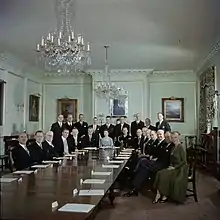Douglas Harkness
Douglas Scott Harkness, OC, GM, ED, PC (March 29, 1903 – May 2, 1999) was a Canadian politician, teacher, farmer and former lieutenant colonel in the Royal Canadian Artillery.
Douglas Harkness | |
|---|---|
| Member of the Canadian Parliament for Calgary Centre | |
| In office June 25, 1968 – October 29, 1972 | |
| Preceded by | District was created in 1966 |
| Succeeded by | Harvie Andre |
| Member of the Canadian Parliament for Calgary North | |
| In office August 10, 1953 – June 24, 1968 | |
| Preceded by | District was created in 1952 |
| Succeeded by | Eldon Woolliams |
| Member of the Canadian Parliament for Calgary East | |
| In office June 11, 1945 – August 9, 1953 | |
| Preceded by | George Henry Ross |
| Succeeded by | John Kushner |
| Personal details | |
| Born | Douglas Scott Harkness March 29, 1903 Toronto, Ontario, Canada |
| Died | May 2, 1999 (aged 96) Calgary, Alberta, Canada |
| Political party | Progressive Conservative |
| Cabinet | Minister of Northern Affairs and National Resources (1957) Minister of Agriculture (1957–1960) 14th Minister of National Defence (1960–1963) |
| Awards | |
| Military service | |
| Branch/service | |
| Years of service | 1940–1949 |
| Rank | |
| Unit | 4th Canadian Armoured Division |
| Battles/wars | World War II |
Early life and military service
He was born in Toronto, Ontario and moved to Calgary, Alberta in 1929. He graduated from the University of Alberta, then farmed and taught school in the vicinity of Red Deer.[1] He taught at Crescent Heights High School until 1939.
He fought during the Second World War from 1940 to 1945, serving in the European theater of war. He was posted to Great Britain, Sicily, Italy and Northwest Europe.[1] In 1943 was awarded the George Medal "in recognition of conspicuous gallantry in carrying out hazardous work in a very brave manner".[2] Harkness was aboard a troopship when it was torpedoed transiting from Sicily to England. Harkness was awarded the medal for his organization of the abandonment of the ship. In 1945, Harkness was the commanding officer of the 5th Anti-Tank Regiment of the 4th Armoured Division. After returning from the war, Harkness returned to farming, residing in De Winton, Alberta, south of Calgary.[1]
Member of Parliament
In 1945, he was elected to the House of Commons of Canada for the constituency of Calgary East and briefly held the Cabinet positions of Minister of Northern Affairs and Minister of National Revenue under the government of John Diefenbaker. He was sworn into the Queen's Privy Council for Canada on August 7, 1957 as Minister of Agriculture.[1]
He was appointed Minister of National Defence, being sworn in on October 11, 1960.[1] Harkness precipitated a political crisis when he resigned from cabinet in February 1963 in order to protest Diefenbaker's opposition to stationing American nuclear warheads in Canada. The resignation precipitated a split in the cabinet and contributed to the defeat of the government in the 1963 federal election. However, Harkness continued to sit as a Member of Parliament until 1972.
Post-political career
He lived in Calgary until his death in 1999. In 1978 he was made an Officer of the Order of Canada. The Douglas Harkness Community School in Calgary is named in his honour.
Parliamentary functions

- Minister of Agriculture (Acting), (June 21 – August 6, 1957)
- Minister of Northern Affairs and National Resources, (June 21 – August 18, 1957)
- Minister of Agriculture, (August 7, 1957 – October 10, 1960)
- Minister of National Defence, (October 11, 1960 – February 3, 1963)
Archives
There is a Douglas Scott Harkness fonds at Library and Archives Canada.[3]
References
- "New Minister Won GM at Sea". The Crowsnest. Vol. 12 no. 12. Ottawa: Queen's Printer. October 1960. p. 2.
- "No. 36427". The London Gazette (2nd supplement). 17 March 1944. p. 1265.
- "Douglas Scott Harkness fonds, Library and Archives Canada".